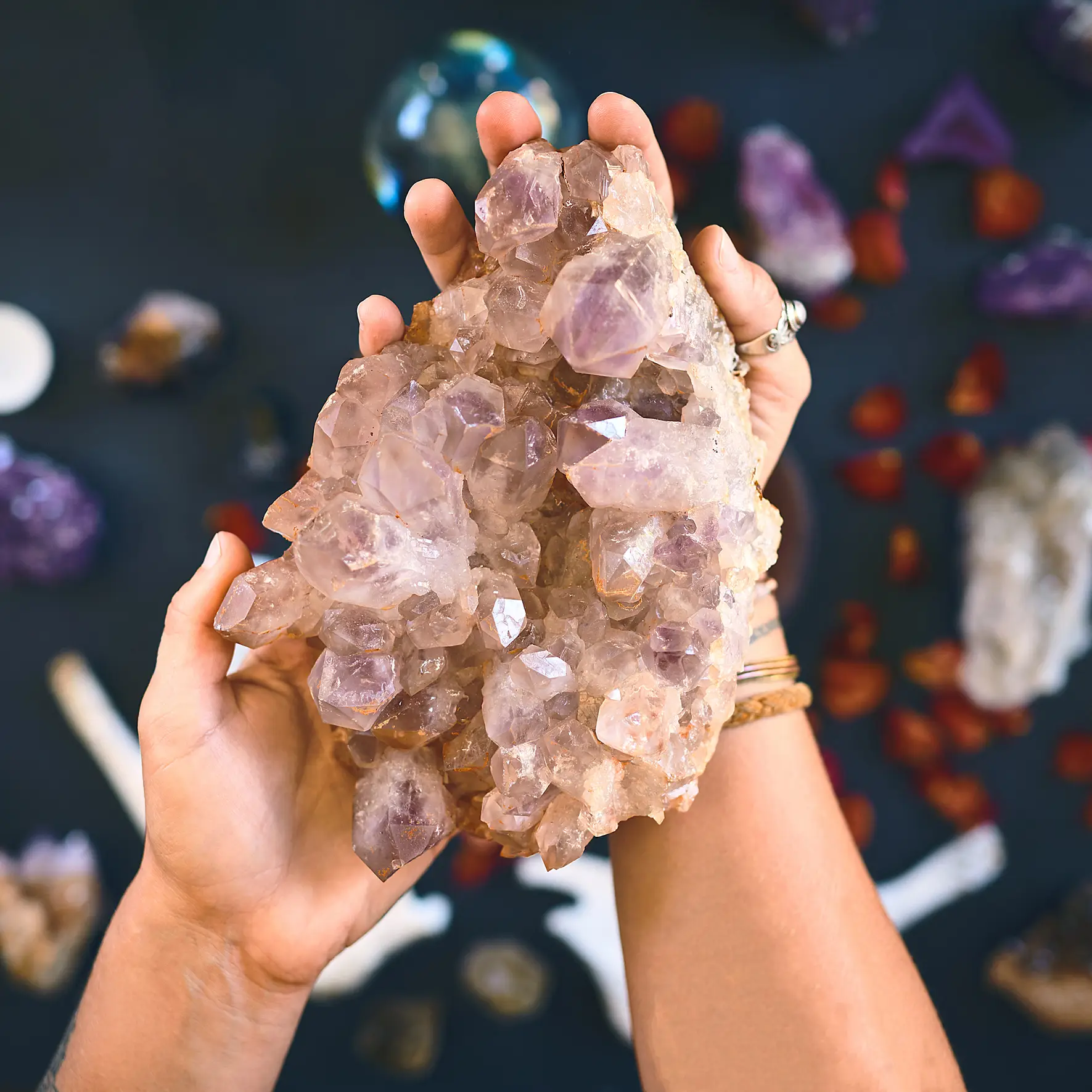I recently read a meme that said, “Nothing sacred is for sale, period.” While selling spiritual wares at a premium is not a new concept, this phenomenon as it pertains to “alternative spirituality” has recently skyrocketed. I wrote about spiritual brands for RetailWire back in 2019. But a lot has changed since then.
The sale of spiritual wares has exploded and the goods that are being sold look a lot different than they did four years ago. In a pandemic addled world where even common viruses like the flu have become more destructive than ever, it only makes sense that customers are searching for purchases with deeper meaning. We see this in how young consumers value experiences over things. Yet customers spending on products that make spiritual promises is also evidence of their search for deeper meaning from their dollar share.
Self-care items are the fastest growing category of 2022. The messaging on many of these products also tout the promise of spiritual elevation in some form, whether it be through magic, raising your Kundalini energy, activating your chakras, connecting you with Jesus’ will, and so on. Whether a customer’s spirituality is a legacy religion or new age paradigm, there are brands that have figured out how to monetize it.
Make no mistake, the way we’ve come to look at spirituality as a secular revenue source creates tangible ROI for certain groups and individuals. The market for religious organizations is expected to grow from $326 billion in 2021 to $411.98 billion in 2026. However, customers without a traditional religious affiliation, or those looking for a little something different, can pay for solace and a sense of direction with everything from psychic readings to a “magic infused” blouse. This is not a joke.
Psychics and the Hefty Price of “Magic Infused” Goods
Customers have been paying for spiritual services since the first human history was recorded. Many modern consumers prefer psychics and the promise of magic to traditional tithing and supporting a church, whatever form that may take. So many, in fact, that the psychic services industry that came in at $1.9 billion U.S. dollars in 2011 has since jumped to $2,222.4 billion in 2022. With the exception of perhaps the emergence of the next messiah, global guru, or major spiritual leader, this number is only forecasted to rise as people seek more meaning in their lives.
Although reality shows like “Real Housewives” may have conditioned you to think differently, most individuals can’t afford to bring their psychics as arm candy to cocktail hours with the gals. A “magic infused” necklace, on the other hand, makes for a more affordable –– and transportable –– option.
Logan Hollowell is the perfect example of a retailer selling “magic,” at a premium –– between $800 to $30,000 a piece. Check out this excerpt from the company’s About Us page:
“Logan Hollowell designs collections that encompass ancient wisdom, magic and inspiration from the universe, always visualizing the spiritual impact and healing effect that a piece will have on its wearer. Her creations are much more than meets the eye, dusted with Magic before they become instant heirlooms.”
Marketing messaging aside, this is a novel way to position gemstones, engagement rings, and ethically sourced diamonds, all inspired by the “stardust in all of us.” Cynics may scoff, but this is big business for a consumer segment that takes its spirituality seriously.
Are Retailers Facilitating Self Care, or Making Hollow Promises?
It’s kind of incredible that in the age of transparent customer reviews retailers are able to sell jewelry based on alleged metaphysical powers. For many customers, it’s less about believing that they’re buying products to help them spiritually ascend to a better place and more about facilitating self-care. Make no mistake, self-care has gone beyond just being a trending topic to enter the become part of the core purchasing ethos of a generation.
Self-care items are the fastest growing category of 2022. It’s hard to monitor the sales of self-care items since they span a range of verticals, including bath and beauty products, journaling materials, CBD products, inspirational books, home décor and plants, jewelry, health food, ritual items and crystals, and more. The messaging on many of these products also tout the promise of spiritual elevation in some form, whether it be through magic, raising your Kundalini energy, activating your chakras, connecting you with Jesus’ will, and so on. Whether a customer’s spirituality is a legacy religion or new age paradigm, there are brands that have figured out how to monetize it.
The growth of the self-care industry has been accelerated by social media. Google searches for “self-care” increased by 250 percent since 2020. Self-care kits and gift baskets are flying off the shelves on Etsy and Facebook Marketplace. Items with “natural,” and “organic” stickers are in high demand. Indie makers and SMBs selling “ritual items” walk the fine line between self-care and promising literal magic. This Instagram ad from jewelry and ritual item brand, Catori Life, perfectly encapsulates this messaging, “Our bestselling Hoku Amulet Earrings carry magic from the stars and were designed to inspire and empower you.”
Back to Nature vs Store Bought Serenity
The Cottagecore trend may have peaked in 2020, but customers still gravitate towards retailers that reconnect them with nature. Subtle, innocuous-seeming psychedelic references are the biggest nature craze of the moment in mainstream apparel and CPG. Mushroom insignia is creating demand for a different type of magic, accelerated by the 2022 Netflix documentary series, “How to Change Your Mind” and Oregon’s legalization of psilocybin for personal use. The interesting thing about the mushroom trend is that it straddles the fine line between next gen’s mental health obsession and Cottagecore. After all, Cottagecore has a storybook quality that perfectly embodies storybook spirits and sprites.
Coffee companies like Four Sigmatic and Ryze are elevating their grounds with non-psychedelic fungi. Fashion retailers like SheIn, Cider, Rue21, Forever 21, and too many others to list are following suit; hawking everything from mushroom-embroidered sweaters to overalls adorned with Fantastic Fungi.
It could be an indirect shout out to artist Kusama with all the red mushroom with white dots used in emojis and on most mushroom-themed apparel, but it is actually Amanita Muscaria, aka, natural fly agaric. Little known fact? Amanita is poisonous to humans. Retailers that feature images of Amanita on their wares should probably divulge this information to protect young people who are exploring psychedelics to address their mental health issues.
We’re living in an open-minded, yet often desperate-feeling world. It’s easy to see why customers are looking to make purchases that elevate their vibe and provide some protective shields. The challenge is separating fact from fiction and marketing buzz from something meaningful. Desperate people reach for easy to grasp straws, but’s that’s not necessarily real. You’ll still find me instead making purchases that make a tangible positive impact on the environment or disenfranchised groups. As retailers continue to dabble in spirituality and add spiritual benefits to their product claims, authenticity and safety are key. The retail world will only become more surreal in the years to come. Our first priority should be protecting and assisting those struggling in tangible ways. Feeling good about yourself is definitively a result of helping others, and that’s where the true spiritual lift takes place.





